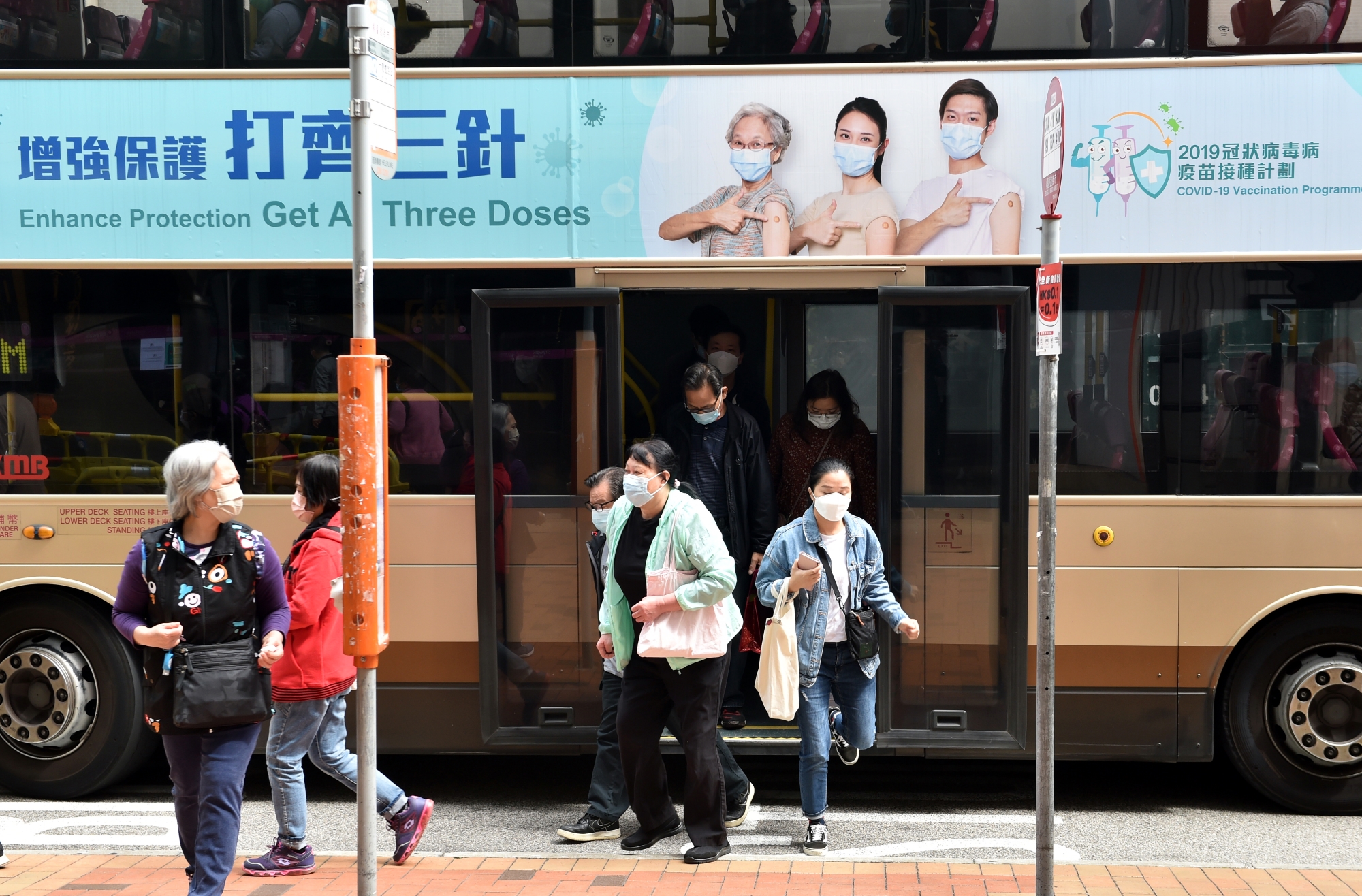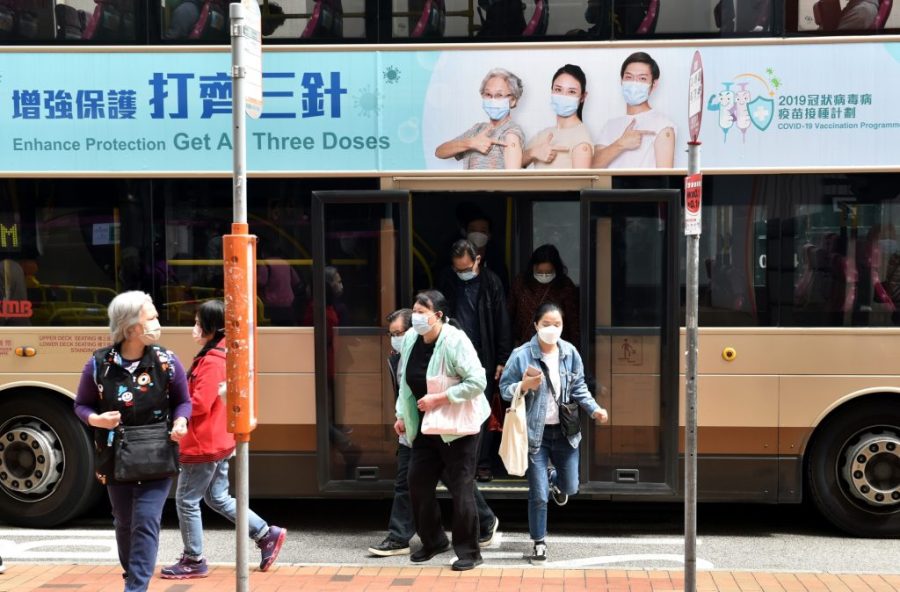It’s been over two years since the first cases of the novel coronavirus emerged outside of mainland China, and new variants are still emerging regularly, from Alpha to Beta, Gamma, Delta, and the latest, Omicron.
First reported to the World Health Organization (WHO) from South Africa in November 2021, the Omicron variant is over four times as contagious as Delta. Many of the symptoms are similar to previous variants, however, according to research by the LKS Faculty of Medicine at The University of Hong Kong, the variant tends to be less severe and causes fewer lung infections than the original SARS-CoV-2.
Still, some people – particularly those with underlying conditions, are in old age or who are unvaccinated – may develop a severe case and need to be hospitalised. To hear what it’s like to experience the Omicron variant, we asked four people in different parts of the world to share their experiences.
Swept up in Hong Kong’s fifth wave
The Omicron variant’s ease of transmission has overwhelmed many healthcare systems around the world. That’s exactly what’s happening in Hong Kong, as the city of 7.5 million battles a massive outbreak.
The city recorded nearly 60,000 new cases on 9 March 2022 and 195 fatalities, representing the world’s highest death rate from the Omicron variant. Meanwhile, health services continue to struggle and patients have been experiencing long wait times for admission due to a shortage of medical personnel and hospital beds.
Wida, who does not have a surname, a 42-year-old domestic worker from Indonesia, arrived in Hong Kong in July 2019. Soon after, she began working for a family in Ping Shan, the New Territories, where she takes care of two children: a 5-year-old girl and a 3-year-old boy.
On 16 February 2022, the children’s father tested positive for Covid-19. Within a day or two, the two children contracted the virus, then Wida. The mother was the last one to become infected.
“We all had sore throats, coughs and runny noses. And I’m feeling a bit weaker and more tired than usual,” said Wida. “But I didn’t have a fever, and neither did the children.”
Both of her employers, however, had a fever of around 38 degrees celsius for the first two days. They were doing much better on day 5, she says, adding that her symptoms had started to disappear. “My bosses – both vaccinated – did not have fevers anymore and the children were doing fine; they were playing normally inside the house.”
According to Wida, who is fully vaccinated, the family took Panadol and some cough medicine while isolating at home. “Good thing my female employer bought some food stuff just before her husband tested positive, so we have some [supplies] at the moment and we just cook whatever we have. And if we run out of food stock, we have plenty of [instant] noodles,” she adds.
Wida says the family stuck together and supported each other during their home quarantine, which was a relief given the turbulent situation. As reported by Hong Kong media, some domestic workers in the city have been fired after testing positive for Covid-19 and forced into the street.
“Maybe they got fired because the employers are afraid to catch the virus, too. People in Hong Kong are really afraid of Covid-19. It is so sad,” says Wida.
“We need to observe the health and hygiene protocols, maintain our health, keep fit, eat healthy food and always pray,” continues Wida, who is a devout Christian. “I miss going to church and hanging out with my friends and I hope we will be able to get back to our normal activities soon.”
Only ‘a matter of time’ in the United States
When Kate Springer, the managing editor of Macao News, moved from Hong Kong to the US with her husband and infant daughter in September 2021, she worried it would be “just a matter of time” before her family caught Covid-19.
The US has the highest number of Covid-19 cases in the world. The current tally exceeds 79 million and more than 950,000 total deaths. Upon returning to the US, the 34-year-old journalist took many precautions, such as wearing KN95 masks, getting a booster shot in December, and using hand sanitiser regularly. She also felt relieved that her new home, the city of Philadelphia, Pennsylvania, required individuals to be vaccinated in order to go to restaurants, gyms and salons.
But in January, Covid-19 finally caught up with her. On 25 January, Springer felt a cold coming on. She didn’t think anything of it at first, but took a rapid antigen test at home just to be safe. It was positive.
“I wasn’t even going to test myself [at first] because I just had a sore throat. I thought it was like a cold. It just wasn’t serious enough for me to be concerned about it,” says Springer.
After the results, she isolated herself in a bedroom and used a separate bathroom. But a few days later, her husband, Chris Gladd, tested positive and, exactly seven days after Springer’s test, their 9-month-old daughter, Penelope, was positive, too. Since her own case was so mild, Springer and her husband were not worried about themselves.
“I think our symptoms [were] very similar. Sore throat, a little dry cough, runny noses for a while, fatigue and headache. I never lost my sense of smell or taste and it was pretty mild,” she says. “The fatigue is definitely something with Omicron that people talk about a lot. The fatigue can last for weeks. But again, I’ve had colds that are way worse.”
The couple felt more concerned about their daughter, since she is unvaccinated and could have underlying conditions they are not aware of. “We noticed her cheeks looked rosy and she felt a little warm. When we took her temperature, it was 37.2 [degrees Celsius].”
Penelope also developed a mild cough but never had trouble breathing. “We were really worried those first two days. Will it get worse? Or was that the worst?” Springer says. “That uncertainty as a parent was very scary.”
Referring to guidelines from the US Centers for Disease Control and Prevention, Springer says the family self-isolated for 10 days at home. During that time, Springer and Gladd recovered within four to five days, and Penelope’s symptoms disappeared after about a week. When the baby seemed back to normal, they felt a wave of relief.
After experiencing it herself, Springer does not think that Omicron poses a serious threat to most fully vaccinated people but expresses concern about the unvaccinated, as well as children, older generations and immuno-compromised people.
“There are still a lot of people out there who are dying unnecessarily. I don’t think we’re quite ready to get back to normal. We still need to be wearing masks and taking other precautions [like getting vaccinated and boosted].”
When asked what advice she would give to those who are feeling worn out from the pandemic, she says: “Just like all the pandemics of the past, we will eventually get to the other side of this. I think there’s a reason to be optimistic that it is coming sooner rather than later. Just hang in there. We’re all in it together and no one is alone. We’re all more interconnected than we ever imagined.”
A precautionary hospital stay in Indonesia
At the end of January, Geby Millenia, a full-time nursing student based in Jakarta, Indonesia, spent a week in Bali, visiting her brother and sister-in-law. Two days before her flight home on 2 February, the couple contracted the Omicron variant and informed Millenia.
“A day before I left Bali, I did a swab test and the results came back negative. But then in the evening that day, I developed some symptoms: a mild fever, cough and sore throat. After confirming with the hospital where I took the swab test that I could proceed with my travel, I decided to fly back to Jakarta,” Millenia says.
“During my flight, I felt my symptoms developed further and I was afraid I really caught Covid-19 from my brother, so as soon as I arrived, I went straight to a hospital. I was worried that Covid-19 could affect my asthma,” says the 21-year-old, who received two Sinovac vaccines in mid-2021.
Although her symptoms were not severe, the hospital quickly admitted Millenia after her test came back positive due to her underlying condition. Millenia stayed for six nights, where her cough and fever improved. In the end, the virus did not cause her asthma to flare to Millenia’s relief. During her stay, nurses and doctors gave her vitamins, as well as cough, antiviral and anti-nausea medicines.
After Millenia was discharged, doctors advised her to continue isolating at home for a couple of days to avoid spreading the virus. Millenia never lost her sense of taste or smell and describes the symptoms as “more like a cold.”
Since the pandemic began, Indonesia has recorded more than 5.8 million Covid-19 cases and over 151,000 deaths. It currently ranks 15th among the countries with the most number of cases. To curb the spread of Omicron, the Indonesian government increased quarantine periods for fully vaccinated arrivals from seven to 10 days in December 2021 and tightened social restrictions earlier this year.
However, the government has recently lifted all quarantine requirements for Bali, with a plan to open the entire nation starting 1 April.
Despite the high case count, Millenia thinks people should remain positive during this challenging time. “Worries are normal. I think every disease will make us worry one way or another. We just have to fight against Covid-19 and stay optimistic.”
A ‘common thing’ in South Africa
“I didn’t take any medication for Covid; I just took cough syrup and vitamin C,” says Liam Alexander, a Macao resident who recently relocated to his native South Africa. “I didn’t lose any sense of smell – only lost my taste, but it was just due to a congested nose.”
Born in Cape Town, the 26-year-old dance teacher and professional performer has boomeranged to and from Macao several times. He initially moved to the city in 2006 while in secondary school, then returned to South Africa to complete his Diploma in Musical Theatre and Dance.
Alexander returned last year for a job as a dancer at The Londoner Macao, then relocated to Cape Town in early January 2022 to continue his bachelor’s degree in dance education and pursue career opportunities.
He contracted Covid-19 roughly two weeks after his homecoming, despite having received three BioNTech jabs in Macao. “After developing some symptoms I got myself tested for Covid-19 at one of the [Cape Town’s] allocated testing spots.”
Alexander does not know how he got the virus, but suspects it happened while he was getting settled and running errands in Cape Town. “It’s difficult to tell where you get it from in public. I was in stores, going around the city, going to the traffic department, sorting out my driver’s license,” he says.
In South Africa, where the number of Covid-19 cases is nearing 3.7 million, Alexander says many people view the virus as a “common thing” and have accepted the situation. Unlike Macao, the country does not require those who test positive to quarantine at a government-run centre.
Instead, the South African government recommends positive cases quarantine at home for one to two weeks. In line with this advice, Alexander self-isolated for eight days.
“There was a lot of phlegm in my chest. I felt a bit weak, a little bit fatigued, a lot of headaches. I didn’t have a fever,” he recalls. “I wasn’t scared. It was just an inconvenience because I had classes. I was able to move; just tired, lazy, but they were just like normal days to me.”
After about a week of rest, most of his symptoms began to disappear. Reflecting on the trajectory of the pandemic, Alexander thinks Covid-19 is part of life now. “Obviously, we still need to be a little cautious and not be careless,” he adds. “But I definitely think it’s something that is manageable now.”
Comparing South Africa with Macao, he says: “I think Macao has done a very good job in protecting its people, with all the benefits made available to the people during this pandemic situation. Obviously, it’s a different situation here – a different country and a different way of life.”
“South Africa is doing the best we can with our situations. It’s such a vast place, whereas Macao is able to have a two-week lockdown and its economy won’t collapse.”
Life back in Macao
As of 9 March, Macao has recorded 82 cases and zero deaths. The city’s health experts urge residents to avoid travel unless it is essential and maintain precautionary measures, such as wearing a face mask, frequently washing hands and getting vaccinated. According to experts, the No. 1 thing individuals can do to protect themselves is get vaccinated and boosted. As of 10 March, 80.2 per cent of Macao’s population (around 547,000 people) has been vaccinated.
Leong Iek Hou, head of the Control of Communicable Diseases and Surveillance of Diseases Department of the Health Bureau said in January that vaccination against Covid-19 can reduce the risks of infection and, more importantly, suffering a serious condition or dying from the disease should you catch the virus.
However, Leong underlined earlier this month that the antibody levels of those who have received two Covid-19 jabs will gradually diminish with time and urged everyone in Macao to get a booster jab to increase their Covid-19 antibody levels.






